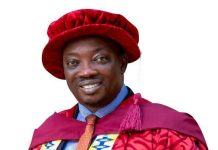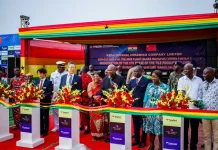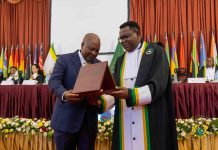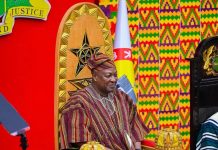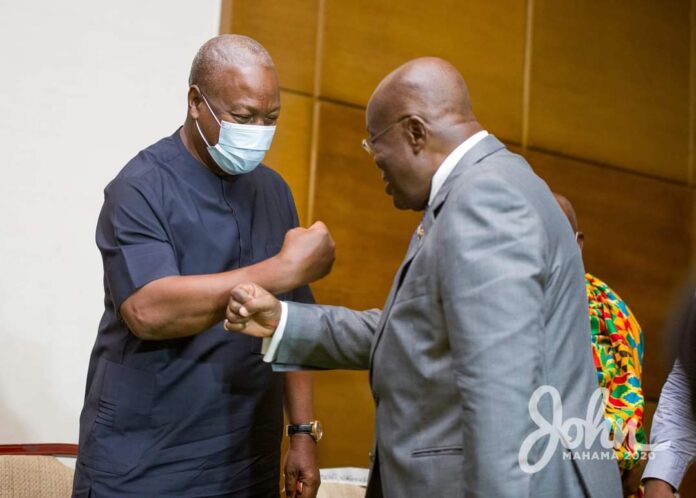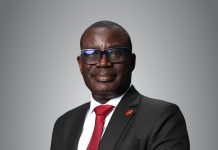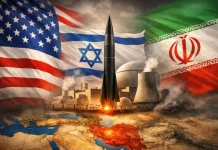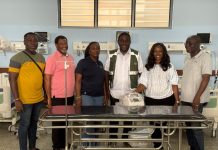President Nana Addo Dankwa Akufo-Addo has expressed his commitment to building the local economy in order to improve the standard of living of the people despite the pandemic.
Mr. Akufo-Addo indicated that his administration has managed the economy, in spite of the ravages of the coronavirus pandemic, better than what was bequeathed to him by his predecessor John Dramani Mahama.
He was speaking during this year’s presentation of New Year Greetings of members of the Diplomatic corps at the Peduase Lodge in the Eastern Region on Wednesday February 9.
He said “As a result of government’s policies, the economy grew at the provisional rate of 5.2 per cent in the first three quarters of 2020.
“This growth is expected to be to sustained in the medium term,” he said.
He added “The overall real GDP for the medium term is projected to grow at an average of 5.6 per cent and we remain committed to turning to the fiscal deficit target threshold as enshrined in the Fiscal Responsibility Act , ACT 982 from this year. We will continue along the line of promoting inclusive growth , encouraging investments and improving the standard of living of Ghanaians.
“It is encouraging for me and my party, the New Patriotic Party (NPP) to recall the rate of growth of the economy, 5.6 per cent against the the backdrop of the exceptionally difficult circumstances of the Covid era, is still considerably better than the 3.4 per cent we inherited from our predecessor’s administration.”
Mr Akufo-Addo’s comments come at a time Former President John Dramani Mahama had blamed him for the challenges that the economy is going through at the moment.
Mr accused the government of profligacy and also recklessness as far as election-related expenditure in 2020 is concerned.
In a statement, the Presidential Candidate of the NDC in the 2020 elections said “There is no dispute that the Ghanaian economy is in deep crisis, a crisis marked by huge budget deficits, an unsustainable public debt, rising inflation, a rapidly depreciating currency, ever rising cost of living and a loss of confidence by both domestic and international investor communities.
“Yet, President Nana Akufo-Addo and his Head of the Economic Management Team, rather appallingly, remain nonchalant in the face of this serious crisis and have limited their response to the imposition of very harsh and regressive tax measures, one of which is the E-Levy, which has been roundly rejected by the people of Ghana.
“Like one drowning and yet clutching at mere straw to stay afloat, this government has banked all its hopes on the E-Levy, which, given the gravity and depth of the problems that have beset our economy, is neither adequate nor viable as a sustainable response to the crisis.
In the face of this serious crisis, government has also resorted to unhelpful political posturing over suggestions on how to stem the downward spiral, ensure discipline and help the economy to recover.
“The knowledge shared at Senchi crystallized into our Homegrown Fiscal Consolidation Programme, which we eventually presented to the IMF for support. The IMF agreed entirely with our homegrown strategy whose implementation restored stability to the economy and laid the strong foundations that this government, just as the World Bank in 2016 forecasted, profited from between 2017 and 2020.
“But for the profligacy and also the reckless election related expenditure in 2020, which undermined all the progress that had been made, our economy would not have taken the catastrophic nose-dive it has taken and left us all reeling under hardship.
The Akufo-Addo administration in 2020/21 received and misapplied the largest windfall or bailout in Ghana’s history: a $1 billion concessional facility from the IMF, another $1 billion in SDR allocation, $430 million from the World Bank, $250 million from the Stabilization Fund, Gh¢10 billion from the Central Bank. This amounted to a total of about Gh¢33 billion.”

